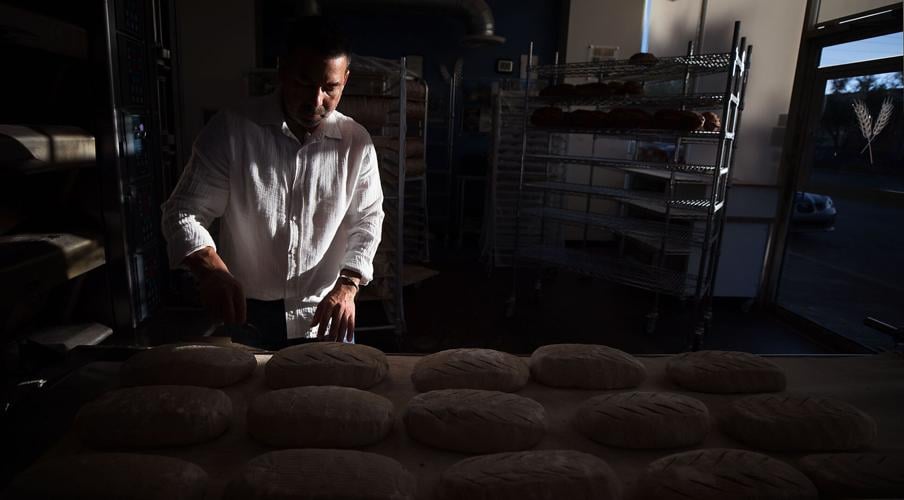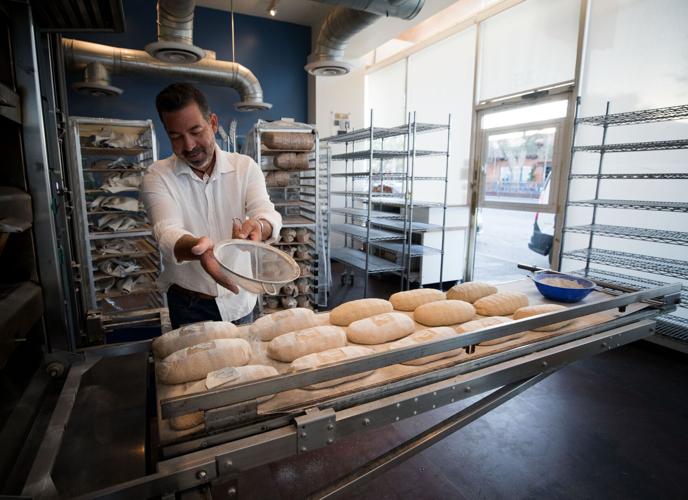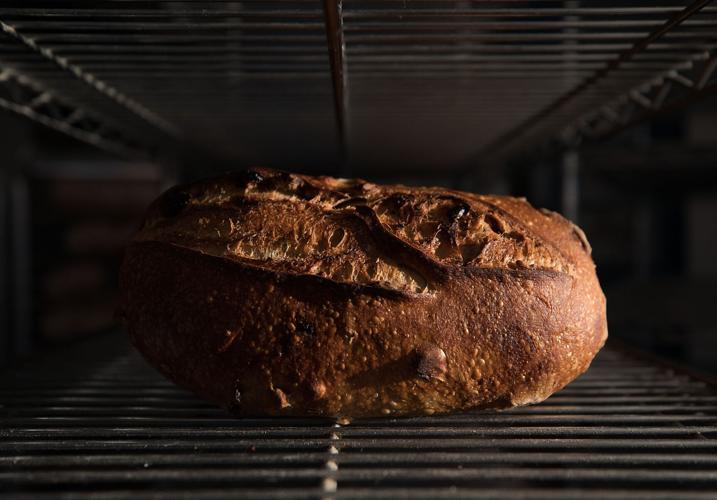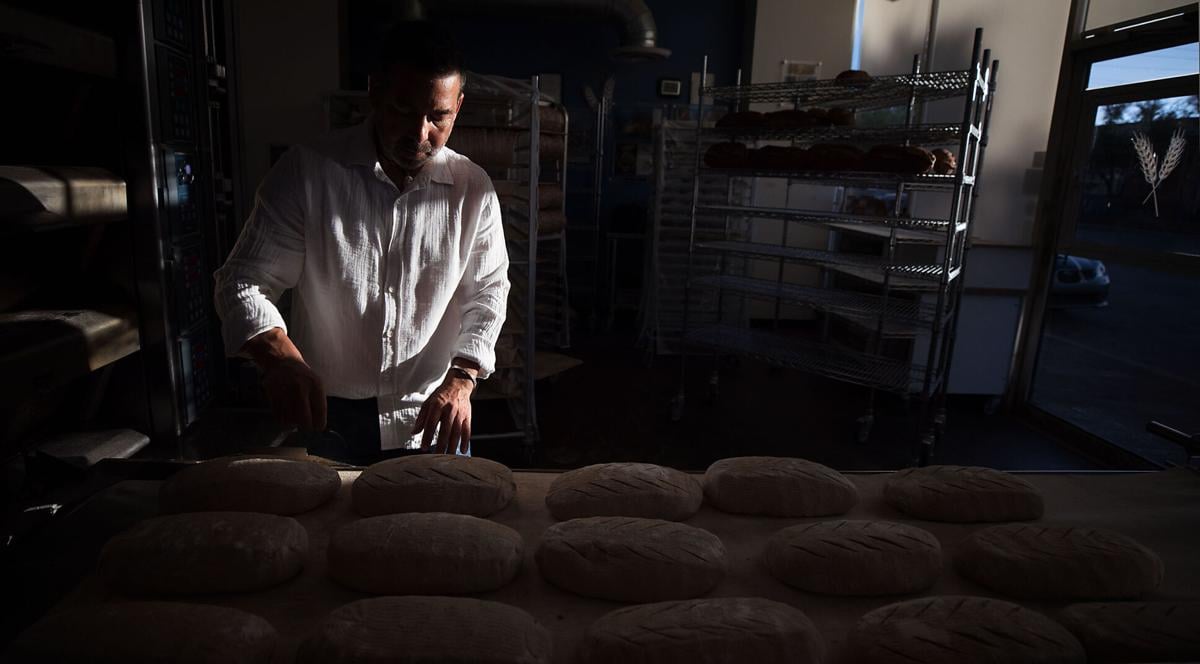Don Guerra often starts his days in darkness.
Even in the longest days of summer, when the Tucson sun levels its uncompromising gaze as early as 5 a.m. and over a third of his customer base has fled because of that heat, Don is up. He’s driving under sparse streetlights, dimmed for our dark skies, to begin the day at Barrio Bread, his acclaimed, inevitable, home.
The image people most associate with Barrio Bread might be the long lines of customers, socially-distanced, who wrap around Broadway Village, 18 S. Eastbourne Ave., and its parking lot in all kinds of weather to pick from each morning’s limited selection of artisan sourdough loaves. This is not a fad. For Don and for us, the community he feeds, it’s every day.
“The bread makes the baker,” said Don. He’s traveled the world and talked to bakers across different cultures. A friend is a baker in Taiwan: they bonded over their shared passion. Bakers have certain universal qualities, he said: “Patience and perseverance. Being gentle, able to adapt.”
Today, Don won a James Beard award, one of the nation's highest culinary accolades, for outstanding baker.

Don Guerra, owner of Barrio Bread, 18 S. Eastbourne Ave., puts the finishing touches on the heritage loaf before baking on June 2, 2022.
Acclaim was never his goal, but it is a byproduct of his commitment to his work.
“If I were to win the award, it would be for Tucson, the community that has supported me here: my customers, my staff, my friends and family. It would validate my life path, that I’m on the right track, but it would really be for Tucson,” he said a couple weeks ago, before the James Beard winners were announced.
When he looks ahead, his goal hasn’t changed. “It’s the same,” he said. “Focus on the product; focus on the people.”
When he talks about his work, I get the sense that he would be doing this with or without material success or acclaim. He is grateful for his family — Sofia, Mateo and Jen Guerra — for being his biggest supporters. He is grateful for Tucson because this is the place that loved him and his bread and allowed him to do exactly what he wants — which is work, very very hard.
Work to build a bakery so cherished customers line up for it. Work to found and grow a company that makes sustainable, heritage grains across the Sonoran region. Work to employ his community in Southern Arizona and beyond. Work to teach anyone who wants to know how to make artisan bread. Work to partner with Tucson icons like the Flores family and grow Tucson’s culinary might even bigger. Work to bring Tucson prosperity and perfect, nutritious loaves of sourdough bread.
Don’s the kind of guy that relaxes when he’s exercising — hiking, biking, going on walks, swimming. Even though he gets up before 4 a.m., he doesn’t go to bed early, so he can spend evenings with loved ones. The guy has energy.
“My work-life balance is more like harmony,” he said. He’s completely a baker; completely an entrepreneur; completely an educator; completely a father.
“[Bread] is my love. I’ve been doing it for 30 years,” he said. If he says he’s married to the bread, he doesn’t say it as a punchline, but as a vow. “Whatever it takes, I’ll get there,” he said. “I’m a fighter.”
His achievements start with a simple prerogative: seeking opportunities through education and bread.
A proud educator, Don forcefully rejects gatekeeping his knowledge.
“This is why I’m here: to share information,” he said. And yet, he can’t make students into bakers simply through instruction. We have to commit, to submit ourselves to the bread, its needs, particularities and structure. He can show us how, but it’s a choice a baker must keep making every day.

Don Guerra, owner of Barrio Bread, 18 S. Eastbourne Ave., places loaves of bread into baskets on June 2, 2022.
Before he discovered baking, he knew he had hustle from his father, a barber. He knew he was (and is) a hard worker: he got good grades from a work ethic more than a passion for school. When he met bread, and fell in love, he unlocked a path in his life he has been on ever since.
Don has a perfect spiral tattooed on his right forearm. True repetition, he said, would be a complete circle. You come back to exactly where you started. In a spiral, the same direction, the same path, expands.
I first interviewed Don in 2017 at 4 a.m. in the middle of a Tucson summer. His attitude — soft-spoken but as determined as a freight train; easy-going but restless; constantly analyzing — made it seem like the whole world was awake, because this tiny bakery in the middle of a dark night was.
He introduced me to the starter — the bacteria and wild yeast that gives sourdough its flavor and rise — that lived in a bucket in the closet. The starter is still there today, five years older like the rest of us.

A loaf of bread sits on a rack after baking by Don Guerra, owner of Barrio Bread, 18 S. Eastbourne Ave., on June 2, 2022.
The way starters work, powered by a unique microbiome, means the chemical composition of that closet gives Barrio Bread flavor you can’t recreate anywhere else. Don talked about how temperamental the dough is, how he knows it well enough to communicate with it. You mix in flour, and it feeds. Using touch and sight, gained with decades of experience, he divines what the dough is asking for, if it is ready yet.
The way Don talked about bread made bread seem so special, so particular and ever-changing, you could spend a lifetime paying attention to it. Don has.
When he met bread, he fell in love at first sight. That collision has propelled everything else. Its force expands beyond the walls of the bakery into the fields of Sonora, where he traces his father’s Chicano, Yaqui roots and has built cross-border partnerships with farmers to grow the heritage, drought-resistant Sonoran white wheat for his second company, Barrio Grains. He sells these flours and uses them in his bakery.
The robust, whole-wheat flavor of his sourdough is local not only because of the starter’s microbiome. The plants themselves, like the water and earth that grow them, are of our region.
By our 2017 interview, Don had already helped Tucson secure its 2015 UNESCO City of Gastronomy designation. He had recently hired Barrio Bread’s first baker to help him in the mornings, after baking solo since Barrio Bread's inception in 2009. Though he had owned a bakery with a large staff in Flagstaff in his 20s, its success overwhelmed him. This time, he wanted to have his expectations cemented in place before he added anyone else to the team. He emphasized that this hasn't been an overnight success.
Those boundaries are the bumper guards to his path today. He’s only going to ever bake artisan, sourdough bread his way. Yes, that means no croissants. He uses his experience as an educator (“The hardest job I’ve ever had,” he said) to show his employees how he does things, so they can recreate Don’s way, his expectations, on their own.
So much has changed since 2017: COVID transformed our world; he got into business with the Flores family to make Barrio Charro and The Monica; now he has won a James Beard Award. With the focus of his direction — growth — and reliance on his boundaries, these fluctuations come as the force that drives his spiral outward. He comes back to himself — changed but the same.
When he considers his path’s direction, and where it comes from, Don points to another symbol on his body. It’s a pendant necklace that looks like it gets taken off about as often as his tattoo does. The heavy chunk of metal is embossed with the Tohono O’odham symbol of the man in the maze.
Life has many twists and turns: in certain moments, you can look back to see where you came from. The object at the center, though, is immovable, the only cardinal direction that matters in the labyrinth. Don touched the pendant, and said, “Toward inner peace.”
Photos: Don Guerra, of Barrio Bread, wins James Beard Award for outstanding baker
Don Guerra, Barrio Bread
Updated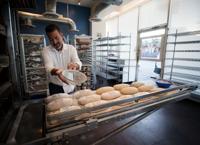
Don Guerra, owner of Barrio Bread, 18 S. Eastbourne Ave. in Tucson, Ariz. puts the finishing touches on the heritage loaf before baking on June 2. Guerra won the James Beard Award for outstanding baker on Monday.
Don Guerra, Barrio Bread
Updated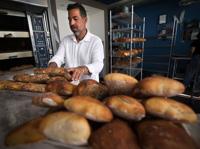
Don Guerra, owner of Barrio Bread, 18 S. Eastbourne Ave. in Tucson, Ariz. places loaves of bread into baskets on June 2. Guerra won the James Beard Award for outstanding baker on Monday.
Don Guerra, Barrio Bread
Updated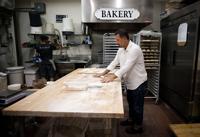
Don Guerra, owner of Barrio Bread, 18 S. Eastbourne Ave. in Tucson. rolls out dough in preparation for baking on June 2. Guerra won the James Beard Award for outstanding baker on Monday.
Don Guerra, Barrio Bread
Updated
Don Guerra, owner of Barrio Bread, 18 S. Eastbourne Ave. in Tucson, Ariz. brings out racks filled with dough in preparation for baking on June 2. Guerra won the James Beard Award for outstanding baker on Monday.
Don Guerra, Barrio Bread
Updated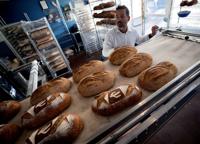
Don Guerra, owner of Barrio Bread, 18 S. Eastbourne Ave. in Tucson, Ariz. pulls out a rack of baked bread on June 2. Guerra won the James Beard Award for outstanding baker on Monday.
Don Guerra, Barrio Bread
Updated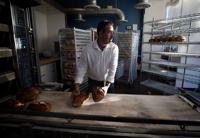
Don Guerra, owner of Barrio Bread, 18 S. Eastbourne Ave. in Tucson, Ariz. places loaves of bread on racks for cooling on June 2. Guerra won the James Beard Award for outstanding baker on Monday.
Don Guerra, Barrio Bread
Updated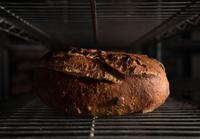
A loaf of bread lays on a rack after baking by Don Guerra, owner of Barrio Bread, 18 S. Eastbourne Ave. in Tucson, Ariz. on June 2. Guerra won the James Beard Award for outstanding baker on Monday.
Don Guerra, Barrio Bread
Updated
Don Guerra, owner of Barrio Bread, 18 S. Eastbourne Ave. in Tucson, Ariz. takes loaves of bread out of the oven on June 2. Guerra won the James Beard Award for outstanding baker on Monday.
Don Guerra, Barrio Bread
Updated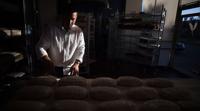
Don Guerra, owner of Barrio Bread, 18 S. Eastbourne Ave. in Tucson, Ariz. scores loaves of bread before baking on June 2. Guerra won the James Beard Award for outstanding baker on Monday.


